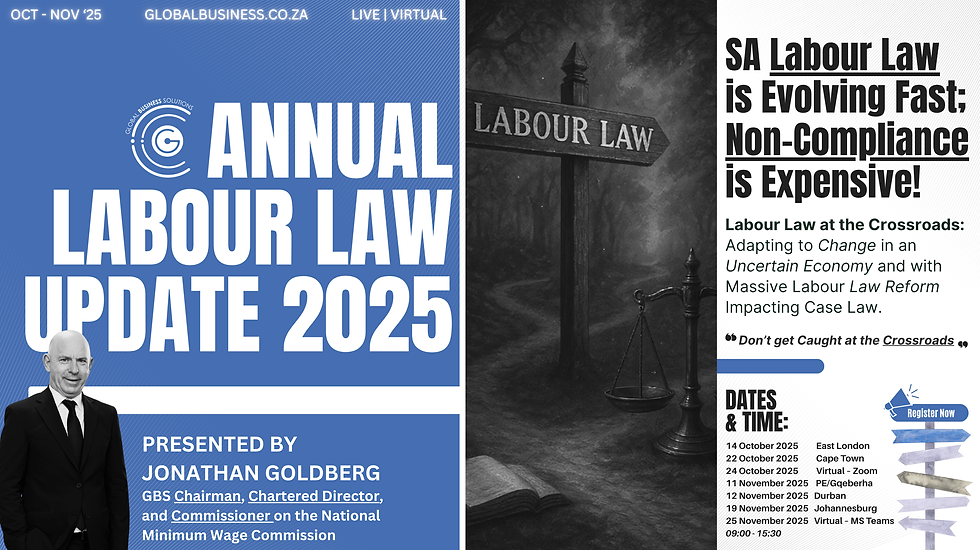Solidarity v Minister of Employment and Labour (J661/23): Contempt Proceedings and the Implementation of Affirmative Action Settlement Agreements
- John Botha

- Sep 23, 2025
- 3 min read

The ongoing case of Solidarity v Minister of Employment and Labour (J661/23) has potential implications for the enforcement of court-ordered settlement agreements and the future of affirmative action. At its core, the Labour Court is being called upon to determine whether the Minister of Employment and Labour has complied with a binding order to incorporate a negotiated settlement on affirmative action into the Employment Equity Regulations.
Background
In June 2023, Solidarity and the Minister of Employment and Labour, following mediation by the CCMA, reached a settlement to resolve Solidarity’s constitutional challenge against the Employment Equity Amendment Act and its accompanying ILO complaint. The agreement was made an order of the Labour Court, requiring that its provisions be gazetted within the Employment Equity Regulations.
However, when the final regulations were promulgated on 15 April 2025, Solidarity alleged that key provisions of the settlement had been omitted. Solidarity then launched contempt proceedings, arguing that this omission violated the 2023 court order.
Legal Principles in Contempt Proceedings
The Labour Court emphasised the established test for contempt. To succeed, an applicant must prove:
the existence of a valid court order,
notice of the order to the respondent,
non-compliance with the order, and
wilfulness or bad faith in such non-compliance.
Labour Court Rule 58 prescribes a two-stage process. At Stage 1, the applicant must provide prima facie evidence of a breach. At Stage 2, the alleged contemnor has the opportunity to explain or justify the conduct, with the Court deciding whether contempt is established and what remedies are appropriate.
In this case, the Court found that Solidarity met the prima facie threshold: the June 2023 order was valid and served; the Minister’s regulations appeared inconsistent with it; and non-compliance was at least arguable. Accordingly, the Minister has been directed to appear at Stage 2 to justify her actions.
Key Disputed Issues
Solidarity maintains that the following provisions, captured in the settlement agreement but omitted from the regulations, should have been included:
Affirmative action must be applied in a nuanced manner, not mechanically.
Absolute barriers to employment for any group must be prohibited.
Compliance assessments must consider multiple factors, not primarily the EAP (turnover rates, skills availability, recruitment trends, mergers, economic conditions).
Employers should not face penalties for justifiable non-compliance.
Affirmative action may not result in termination of employment.
The full agreement should have been gazetted within the regulations.
Possible Outcomes at Stage 2
The Labour Court has various options when deciding Stage 2:
Dismiss the contempt application if wilfulness/bad faith is not proven.
Issue remedial orders directing compliance with the 2023 settlement.
Order amendments to the regulations to incorporate the agreement within constitutional boundaries.
Impose coercive sanctions.
Award costs or ancillary measures.
Lessons for Employers and Policy Makers
This case underlines several important points:
Settlement agreements made an order of court must be implemented with precision, especially when tied to regulatory instruments.
Contempt proceedings protect the rule of law but follow a structured, bifurcated process, ensuring fairness while safeguarding compliance.
Employers should note that the Employment Equity Regulations of April 2025 remain binding in their current form until altered by court order.
The eventual ruling at Stage 2 could redefine how affirmative action measures are framed in law, particularly concerning flexibility and employer defences.
The outcome of this case will not only determine whether the Minister is held in contempt but could also influence the balance between the government’s affirmative action enforcement and employers’ operational realities. For organisations navigating compliance, the implications are profound.
Join us at the Annual Labour Law Update. This year's theme is Labour Law at the Crossroads: Adapting to Change in an Uncertain Economy and with Massive Labour Law Reform Impacting Case Law. What you'll gain:
Master the Digital Transformation of Labour Law in 2025
200+ Labour Law Cases Unpacked by Jonathan Goldberg
Critical Updates on Upcoming Legislation & NEDLAC Amendments
Navigate Workplace Challenges from the Digital Era to Discrimination Laws

View our upcoming events: Upcoming Events, like Social Media in the Workplace, Employment Equity Reporting, Managing Absenteeism in the Workplace, and #ALLU2025.
*All workshops are offered as customised in-house training that can be presented virtually or on-site.
"Global Business Solutions (GBS)—Your Partner in Strategic HR Compliance"




Comments